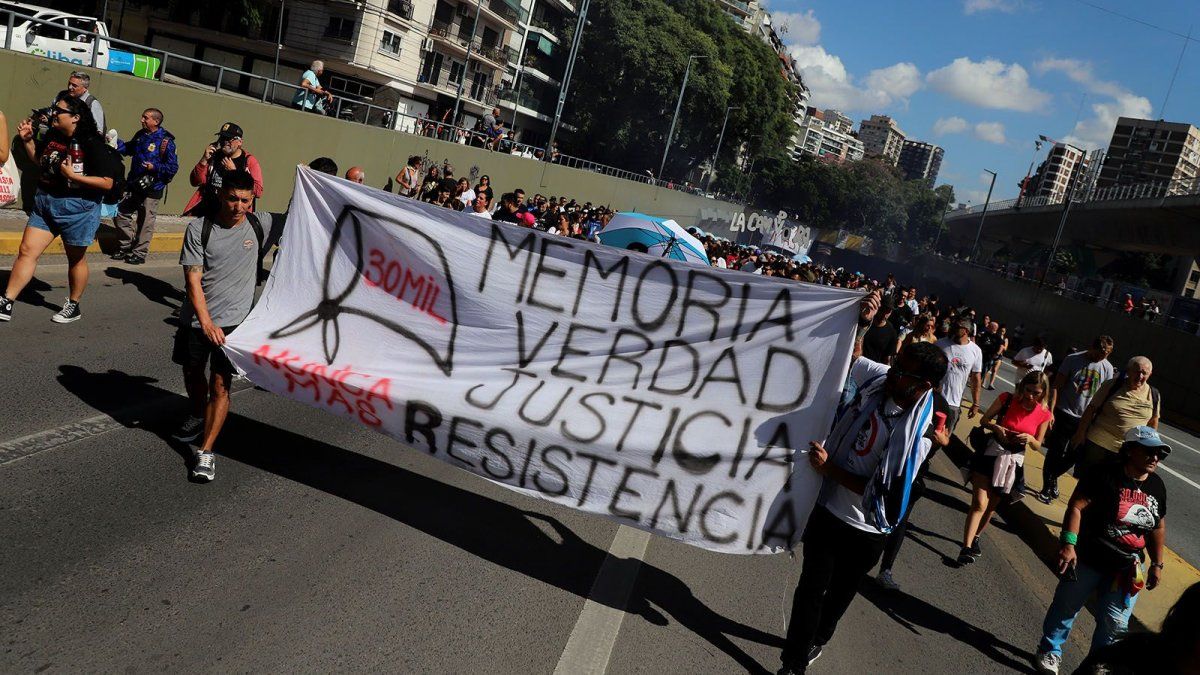And this is because with the coup of the March 24the violation of Human It was systematic. The State organized a mechanism with strategies, tactics, areas, clandestine detention centers, arrangement of bodies, with precise objectives. Their agents tortured, stole babies, raped, killed, disappeared to militants, students, intellectuals, professionals, workers, peasants, supporters or guerrillas. Technically the State became a terrorist and those who channeled that terror (via agents of the armed and police forces and civil complicit) committed crimes against humanity because they are generalized or systematic attacks on civilian population, according to the definition of the Rome Statute.
Continuing with him Rome Statutethen, it is incorrect referring to the events that occurred in that period of time as a “civil war”. Centrally, because there was no second belligerent force. According to denial theories, the guerrillas would become the other belligerent force. But that argument, in addition to ignoring that Most of the victims were not guerrillas, but workersand that at the time of the coup armed organizations were decimated, the truth is that the guerrillas never had a relevant volume of paintings, or control of a territory or authority over some population. The latter are the elements that the Rome Statute takes to define a situation as “non -international armed conflict” and that, clearly, did not occur in the Argentine case.
On the contrary, there was an army (in a broad sense, including the Navy, the Air Force and other armed and police forces) that it was part of a state that had to respect and guarantee the Human of the population and, instead, he systematically violated them. The members of the insurgent organizations that committed crimes or crimes, where appropriate, had to be captured and tried by civil authorities not tortured, executed or disappeared.
But let’s make a little history to understand the reason for such a repressive deployment. The context prior to the coup d’etat of 1976 is of the utmost importance for it. Geopolitically, the world was divided by two power poles (Soviet Union Vs. United States, communism vs. capitalism, broadly speaking).
In Argentina, with the overthrow of Juan Perón and the prohibition of everything that reminded the deposed leader (by Decree No. 4161), thousands of people saw their material living conditions worse. Peronism, in that context, became a shout of rebellion as a countercara of the prohibition and hate that distilled the anti -Peronist sectors that included the theft and vejamen of the body of Avoid. In an environment of censures and taboos, a youth sector committed to the improvement of living conditions found a channel in leftist organizations but, mainly, in the wide framework of Peronism.
In Latin America that youth involved with a better future observed a successful experience: Cuba. Changing the world was at your fingertips. In Africa, the struggle of the colonies for its emancipation brought new brios. Given this, the geopolitical pole dominated by the United States took note and decided to prevent the progressive, socialist, popular progress in this part of America. For this, it had the determined action of local elites and the national armed forces. Dictatorships began in the region. Chile, with the blow of Augusto Pinochet to Salvador Allende In 73 it was the paradigmatic example.
Returning to our country, the unions resisted with strikes by company or by the field to authoritarian dictatorships (although not yet executing crimes against humanity) or the weak civil governments (elected with proscribed Peronism). In this process of growing politicization of broad sectors of society, hundreds of peasants, workers and young people chose to arm themselves and generate violent actions against military or capitalist objectives.
With Perón in Argentina and, after an overwhelming triumph, as president (after the brief presidency of Héctor J. Cámpora) tried to appease the high level of violence that had preceded it and to which he had contributed by encouraging what he called the “Special Formations” (Guerrillas for the previous dictatorships), which lived in the same movement with right -wing sectors.
During his last presidency, certain standards of life were improved but was not right in the peaceful solutions. In fact, from the government’s own entrails, the Argentine Anti -communist alliance organization (Triple A) was born that began to perpetrate heinous crimes against popular militants, cures villeros or intellectuals committed.
In this sense, armed organizations – which had not ceased in their praxis during the democratic government – began to be decimated before the dictatorship, from the actions of the army and the triple A. with which, Returning to the beginning, the large -scale repressive action that implemented the dictatorship of 1976 had other objectives beyond the so -called “war on subversion.” Let’s see.
The coup occurred, first, by the association between the “Red Circle” (Before oligarchy was said) local that sought a regression in the distribution of income in its favor and the strategic interests of the United States and the care of what its “rear patio” called. Those geopolitical and economic causes sought – in turn – generate cultural and social effects. Break the ties of solidarity and its counterpart, promote individualism, on the cultural level. Flatten the social ascent of the popular sectors, generating broad strips of chronic social poverty.
The economic causes of the coup, centrally, are related to the installation of neoliberalism in Argentina and in the region – except honorable exceptions – underpinning the hegemony of global capitalism based on USA. To do this, we had to weaken the national industry by releasing imports. Browse the power of the unions, by restrictive norms, by co -optation or by murders. It is not idle that the majority of the victims of the dictatorship had a workers’ ancestry. Had to spray salaries and work conquests. For the first time, financial activity became a preponderant role in the Argentine economy.
During the dictatorship, society mostly maintained an attitude between fear and disregard. But, also, there were various sectors of the town that resisted. Some unions (example: the strike of 79 and mobilization “Peace, bread and work” In 82 to Plaza de Mayo), base delegates, wild groups of armed organizations, Curas villeros. The mothers and grandmothers of Plaza de Mayo who began to challenge the dictatorship looking for their children or their grandchildren born in captivity. Other human rights and exile organizations also generated acts of resistance.
Democracy, after the defeat of Malvinas And the economic debacle was also conquered by those struggles.
The democratic process had times when he could advance in the consolidation of truth and justice about what happened and other stages in which impunity reigned. Or the denial (as in the present) that is, in short, another way of trying impunity.
Eating the guerrillas victims with those of state terrorism, the speech sought to match violence and then legitimize that there was a war. A return to the theory of the two demons, emphasizing that the worst demon was the guerrillas, understanding that the army had to respond to their attacks and, perhaps, exceeded. In short, it is masked but it is the same speech held by the dictator Videla. And that marasmus, finally, what seeks is the impunity of the perpetrators of crimes against humanity.
Finally, In the level of economic, social and cultural rights, more than 40 years of democracy have not been able to recover all the land lost by the devastating effects of the last dictatorship. Some periods were repair and improvements and others of backward and consolidation of the objectives that motivated that blow.
The polls and streets continue to allow the field of memory to remain in dispute. The clarity of legal concepts and the sensible analysis of history discard the denial foundations that, paradoxically, recurrently return. Trying impunity. The company that massively rejected 2 x 1 (the morigeration of the conviction to those convicted of crimes against humanity) in 2017 does not seem willing to go back in this aspect.
Source: Ambito
David William is a talented author who has made a name for himself in the world of writing. He is a professional author who writes on a wide range of topics, from general interest to opinion news. David is currently working as a writer at 24 hours worlds where he brings his unique perspective and in-depth research to his articles, making them both informative and engaging.




